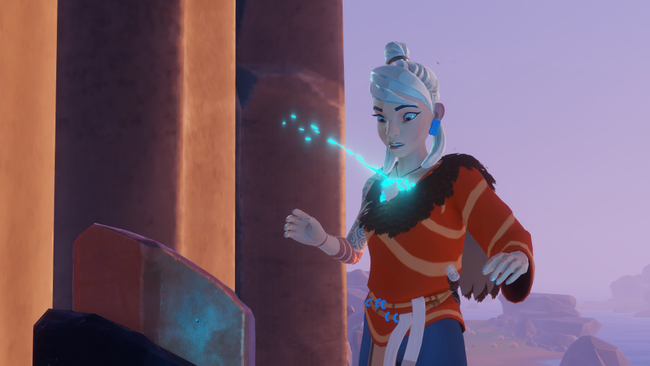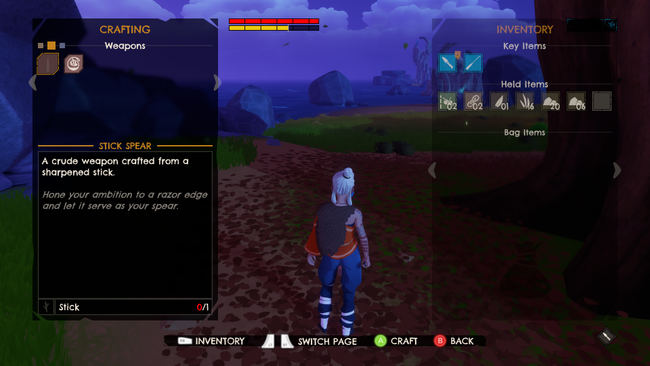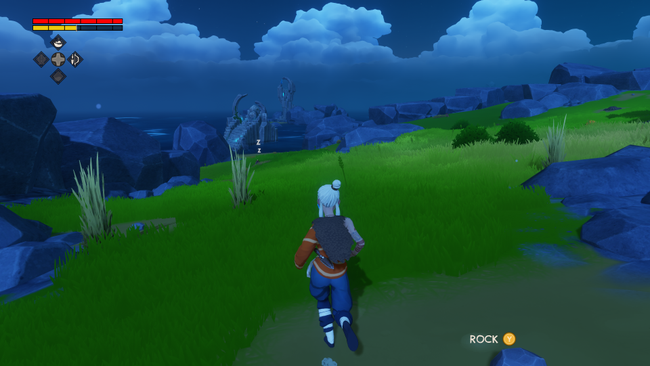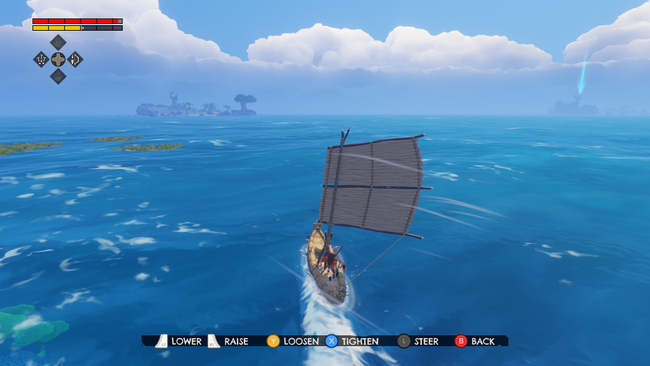
Windbound Preview - a roguelike survival game inspired by Breath of the Wild
It seems like roguelike games and survival games have become more popular in recent years, especially in the indie RPG scene. The Australian development team at 5 Lives Studios then seemed to ask themselves the question: What happens if you .. just .. mash the two together? Windbound seems to be that, and the result might be pretty interesting.
Put briefly, Windbound looks to be a survival game with a roguelike structure, with some clear artistic inspiration drawn from The Legend of Zelda: Breath of the Wild. If the word 'roguelike' makes you bristle with disgust, don't worry. Windbound also has a 'Story' mode, which effectively removes the harsher roguelike mechanics from the game entirely. I got a chance to play a couple of brief segments of the game ahead of its launch later this month.

The playable character in Windbound is Kara, a young woman who is separated from her fleet during a massive storm. Kara is more of a player avatar instead of a bespoke character, in that she never actually speaks outside of some grunts and efforts. Around her neck is some sort of memento sea-shell, which seems to have some important connection with an ancient civilization whose ruins are scattered across the dotted island world that Kara now finds herself in. It looks like not only will Kara need to find her way back to her fleet, she'll probably learn more about this civilization and herself along the way.
The setting in Windbound is a procedurally generated world of islands scattered on an open ocean, meaning no two players' environments are going to be exactly the same. At the onset of the game, all you are given is a basic knife. This is enough to cut down tall grass and take out the smallest of critters, but that's about it. In order to make things easier for yourself, you'll have to basically start from scratch and craft items to survive in this vast ocean world.
Tall grass can be used to make grass ropes. Making rope and collecting various sorts of leaves, bones, and sticks will allow Kara to make a storage bag and sling weapon. Creating a shovel will let you dig, crafting an axe will let you take down larger flora, and soon enough Kara will be able to craft a basic rowboat to travel from island to nearby island. Eventually, you'll be able to make a sail, where then the wide-open ocean is yours to explore.

Breath of the Wild inspirations are readily apparent in Windbound, with a mix of The Wind Waker thrown in. Windbound sports a comparable simplified cell-shaded art style with a focus on exploration. The game's relatively basic combat with local wildlife is also similar. Even the game's soundtrack maintains a similar minimalist style - with a lot of ambient sounds, quite a bit of silence, and some BotW-like piano flourishes thrown in during certain triggers.
There are two basic resource pools Kara needs to manage: health and stamina. Health is exactly what you expect; don't let it deplete else you'll have to start over. Stamina is a refilling bar that allows Kara to dash, swim, attack, and perform other actions. However, the hungrier Kara gets, the lower maximum stamina she has. If she's starving, you won't be able to do just about anything at all. So not only do you have to collect crafting materials to get around, but you'll also have to collect food to stay alive. Food will also eventually go bad, so you can't just stockpile it forever.

As far as roguelike structure goes, the primary element here seems to be that certain slots in your inventory are carried over if you ever fail and have to start over. Ideally, the items you'd want to put in these persistent slots would be valuable components such as a shovel or hammer, so that you don't have to remake those on your next playthrough. So even if you do get unlucky and falter trying to take out a giant boar enemy for materials, at least you aren't starting *completely* from scratch the next time through, and you'll be able to get up to speed much faster in subsequent runs through the game.
Windbound also has two different gameplay modes, Survival and Story. Survival looks to be the standard roguelike mode. Only certain items are maintained upon death, and every playthrough loop starts at the beginning of the game. The Story mode, on the other hand, lets you keep all your inventory items upon death, and you'll only have to restart the current chapter. Additionally, combat difficulty is knocked down a notch in this mode. If a survival-focused game interests you but roguelike structure does not, this is the mode you want.

One tricky part about previewing a roguelike game without being given a lot of time to dig into it is that I didn't get much of an opportunity to see how specifically the game's persistent elements work from run to run. There seems to be a system in place where, eventually, you can earn passive bonuses called Blessings that can make runs through the game more and more painless. I saw a blessing that I could activate which had enemies take more damage from weapons and another that worked like a magic skill to knock enemies to the ground. In any case, with these Blessings alongside some persistent item slots, there look to be a decent handful of elements in place so Kara is more capable in those subsequent runs through the game.
If survival games are your thing, and you like a simplified cell-shaded aesthetic, Windbound is worth keeping an eye on. It remains to be seen how well this larger roguelike structure and storyline all falls into place, but here's hoping it succeeds in offering a nice little twist on the survival genre. Windbound is set to release for PlayStation 4, Xbox One, Nintendo Switch, Google Stadia, and PC (Steam & Epic Games Store) on August 28.